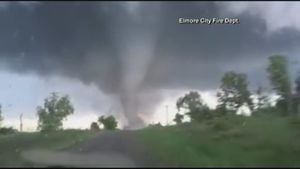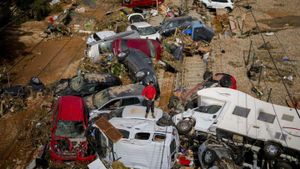The world watched with bated breath as North Korea recently conducted yet another ballistic missile launch, stirring up tensions not just on the Korean Peninsula, but throughout East Asia. Amidst international concerns about North Korea's growing missile capabilities, this recent event has prompted swift reactions, particularly from Japan, which perceives itself under threat from its neighbor’s militaristic gestures.
North Korea's missile launch took place over the backdrop of increasing military activities and heightened rhetoric from its leadership. The country, under Kim Jong-un, has ramped up its efforts to advance its ballistic missile technology, with successive tests emphasizing their ability to strike targets at greater distances. This latest test aimed to demonstrate North Korea’s military resilience and technological advancements, sending shockwaves through the region.
Japanese officials have not remained passive during these developments. Following the missile launch, Japan swiftly condemned North Korea's actions, labeling them as reckless and provocative. Prime Minister Fumio Kishida expressed serious concerns about the continued testing of missiles capable of reaching Japanese territory. He underscored the urgent need for reinforced defense measures and collaborative efforts with allies, particularly the United States. “We cannot allow this continued transgression of our borders to go unchecked,” Kishida stated, reflecting the sentiments of his government.
Japan’s defense ministry reported the launch as having occurred shortly before headwinds began carrying the missile over the Sea of Japan. According to military assessments, the missile traveled approximately 1,000 kilometers before crashing down, reinforcing fears about North Korea's ability to strike not just within the region but also potentially across the Pacific.
Under the current climate, the overall response from the Japanese government includes discussing enhancements to its defense posture. There are talks of increasing investment in missile defense systems. Notably, this includes discussions about acquiring new interceptor missiles and collaborating with U.S. forces stationed within Japan to bolster their joint defense capabilities. Japan’s self-defense forces, which constitutional constraints historically limited, are now under reassessment, with calls from various political circles to expand their defensive operations and methodologies to counter the North Korean threat.
This ballistic missile launch incident is far from isolated. It fits within a broader pattern of hostility and showcases North Korea's weapons program, which has drawn international condemnation and sanctions. Each missile launch seems to mark another step back from diplomatic negotiations aimed at curbing Kim Jong-un's arsenal. With stakeholders like South Korea, China, and the United States observing these developments closely, there’s growing unease about the ramifications should North Korea continue its provocations with unchecked military advancements.
South Korea, sharing its own sentiments about the threat posed by its northern neighbor, also reacted to the missile launch. The South Korean government reaffirmed its commitment to maintaining defense readiness and announced joint military drills with the United States. The historical animosity between the two Koreas is coupled with the ever-evolving military strategies, making the situation tenser than ever.
Meanwhile, China finds itself walking the tightrope amid these developments, advocating for dialogue but simultaneously enabling North Korea's regime through economic support. This has raised questions about Beijing's role as it attempts to balance regional stability against its own strategic interests.
The missile launches have sparked discussions about the role of international organizations like the United Nations. The body has been criticized for its inadequate response to North Korea’s actions, with some members pushing for stronger sanctions and diplomatic measures against the regime. Concerns over nuclear proliferation and regional security are now ever-present on global forums, but responses remain fragmented.
Historically, Japan has always viewed North Korea’s missile activities with suspicion, stemming from both past conflicts and the abduction of Japanese nationals during the late 20th century. The plight of these abducted citizens remains unresolved, exacerbated by North Korea's lack of transparency and cooperation over the years. At the same time, there’s rising public awareness and concern over the missile capabilities, which could lead to increased support for more assertive defense policies.
While North Korea's missile tests appear to signify military strength, they have inadvertently spurred greater unity among regional players. Japan, South Korea, and the United States are increasingly coordinating efforts to establish defenses against potential threats from North Korea. This trilateral approach aims to promote not only security but also diplomatic engagement, emphasizing how interconnected the nations are when it concerns regional peace.
Looking forward, analysts are deliberatively debating what strategies might emerge to resolve these tensions. There’s talk of potentially reviving talks, but many experts suggest any negotiations will likely be predicated on North Korea’s willingness to abandon its missile tests and nuclear ambitions. The hope remains to dial down hostility and open lines of communication - albeit they have been strained at best.
Importantly, the international community is watching critically as Japan adapts its defense strategies. The potential ramifications of Japan becoming more militarily proactive within the region might lead to more significant shifts, impacting not just neighbors but also influencing alliances far beyond East Asia.
With North Korea’s latest missile launch posing significant strategic threats, Japan's response cannot be understated. It’s about reaffirming commitments to national security and exploring collaborative avenues to counter the growing threat. What happens next could reshape the security architecture of East Asia for years to come.



